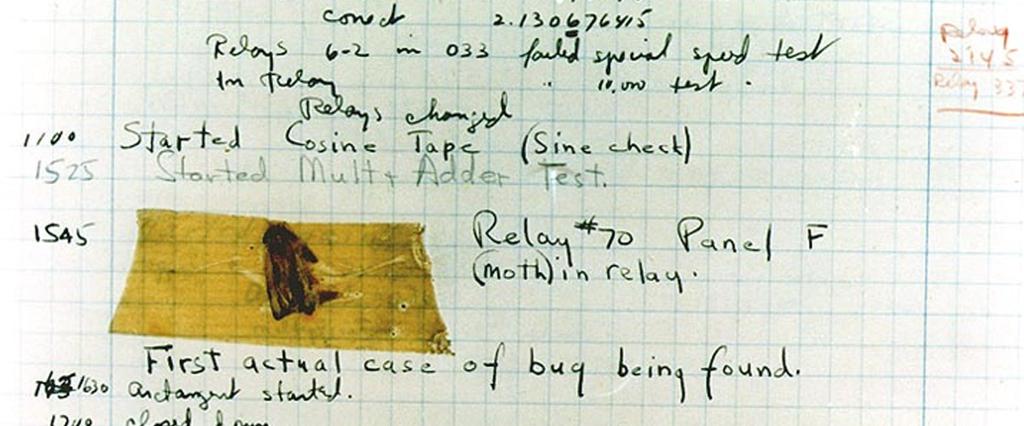Bug squashing guide
✎Modified 2019-09-22 by Andrea Censi
This unit describes how to debug your programs. Do read this accurately top-to-bottom.
If you think this is too long and too verbose to read and you are in a hurry anyway: that is probably the attitude that introduced the bug. It might be programming is not for you.
Historical notes
✎Modified 2019-09-22 by Andrea Censi
First, count your blessings. You are lucky to live in the present. Once, there were actual bugs in your computer (Figure 7.1).

The basic truths of bug squashing
✎Modified 2019-09-22 by Andrea Censi
Truth: it is most likely something simple
✎Modified 2019-09-22 by Andrea Censi
The first truth is the following:
It is always something simple.
People tend to make up complicated stories in their head about what is happening. One reason they do that is because when you are frustrated, it is better to imagine to battle against an imaginary dragon, rather than a little invisible Leprechaun who is playing tricks on you.
Especially in an easy environment like Linux/ROS/Python with coarse process-level parallelization, there is really little space for weird bugs to creep in. (If you were using parallel C++ code, you would see lots of heisenbugs). Here, the reason is always something simple.
Truth: the fault is likely yours
✎Modified 2019-09-22 by Andrea Censi
The second truth is the following:
While there are bugs in the system, it is more likely there is a bug in your code or in your environment.
What could it be?
✎Modified 2019-09-22 by Andrea Censi
20%: Environment errors
✎Modified 2019-09-22 by Andrea Censi
Any problem that has to do with libraries not importing, commands not existing, or similar, are because the environment is not set up correctly. Biggest culprit: forgetting “source environment.sh” before doing anything, or rushing through the setup steps ignoring the things that failed.
10%: Permission errors
✎Modified 2019-09-22 by Andrea Censi
Permission errors are most likely because people randomly used “sudo”, thus creating root-owned files where they shouldn’t be.
9%: Bugs with the Duckietown software
✎Modified 2019-09-22 by Andrea Censi
Please report these, so that we can fix them.
1%: Bug with ROS or other system library
✎Modified 2019-09-22 by Andrea Censi
Please report these, so that we can find workaround.
10%: Problems with configuration files
✎Modified 2019-09-22 by Andrea Censi
Make sure that you have pulled duckiefleet, and pushed your changes.
Finally, given the questions we had so far, I can give you the prior distribution of mistakes:
50%: Programming mistakes
✎Modified 2019-09-22 by Andrea Censi
Of these, 80% is something that would be obvious by looking at the stack trace and your code and could be easily fixed.
How to find the bug by yourself
✎Modified 2019-09-22 by Andrea Censi
Step 0: Is it late? Go to bed.
✎Modified 2019-09-22 by Andrea Censi
If it is later than 10pm, just go to bed, and look at it tomorrow.
After 10pm, bugs are introduced, rather than removed.
Step 1: Are you in a hurry? Do it another time.
✎Modified 2019-09-22 by Andrea Censi
Bug squashing requires a clear mind.
If you are in a hurry, it’s better you do this another time; otherwise, you will not find the bug and you will only grow more frustrated.
How to ask for help?
✎Modified 2019-09-22 by Andrea Censi
Many people just write: “I get this error: … How can I fix it?”. This is not the best way to get help. If you don’t include the code and stack trace, it’s hard to impossible to help you.
The best way to get help is the following:
Gold standard: Provide exact instructions on how to reproduce the error (“Check out this branch; run this command; I expect this; instead I get that”). This makes it easy for an instructor or TA to debug your problem in 30 seconds, give you the fix, and probably fix it for everybody else if it is a common problem.
Silver standard: Copy the relevant code to a Gist (gist.github.com) including the error stack trace. Because we have no way to reproduce the error, this starts a conversation which is basically guesswork. So you get half answers after a few hours.
How to give help
✎Modified 2019-09-22 by Andrea Censi
Step 1: Consider whether there are enough details to provide an informed answer
✎Modified 2019-09-22 by Andrea Censi
The worst thing you can do is guess work – this causes confusion.
I encourage the TAs to not answer any nontrivial question that is not at least at the silver standard. It is a waste of resources, it will likely not help, and it actually contributes to the confusion, with people starting to try random things until something works without understanding why things work, and ultimately creating a culture of superstitions.